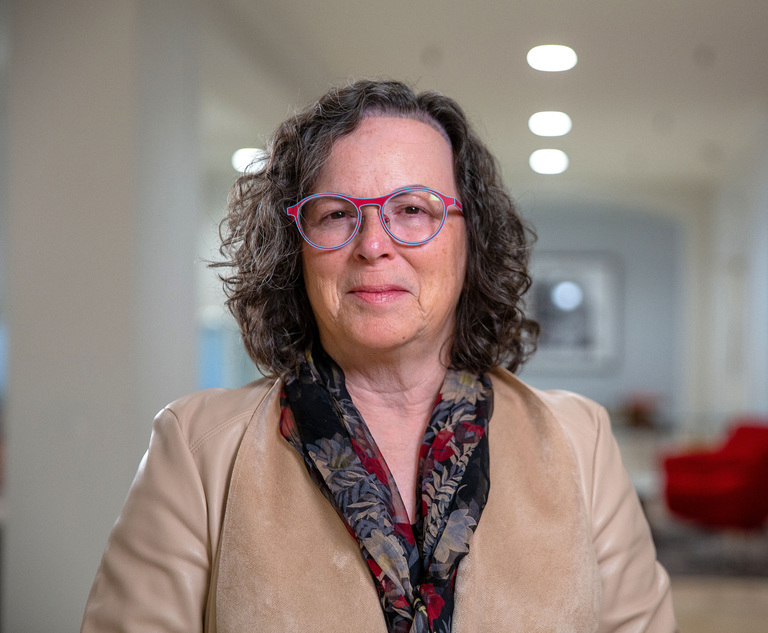'Be Curious. Immerse Yourself in the Business': Why Macy's CLO Has Had a Successful In-House Career
"I almost hate to admit it, but I am most proud of our response at the height of the pandemic during store closures and furloughs," said Macy's Chief Legal Officer Elisa Garcia, who will retire in October after seven years as the department store's top lawyer.
June 16, 2023 at 03:08 PM
7 minute read
Retail Elisa Garcia, CLO of Macy's. Courtesy photo
Elisa Garcia, CLO of Macy's. Courtesy photo
Macy's top lawyer Elisa Garcia said being a successful legal chief requires much more than being a skilled attorney: "You have to think like a businessperson who went to law school."
Garcia, 65, will retire in October after seven years as the department store's chief legal officer. She said while she is often defined by her work, she likes to be known as a mother, daughter, wife and sister.
Prior to her law career, Garcia lived and worked in "fabulous places" like Mexico, the Dominican Republic and Antigua as an energy analyst.
As an attorney, she has guided companies through IPOs, activism, transformational M&A, and helped Macy's rapidly expand its online sales capabilities, survive the COVID-19 shutdowns and fight off an effort by activist investors to spin off online operations into a separate business.
Garcia joined New York City-based Macy's in 2016, after spending nine years as Office Depot's top lawyer and seven years as general counsel of Domino's. Earlier, she was a lead counsel for cigarette-maker Phillip Morris International.
She is known for getting her hands dirty and diving into the businesses she advises. One of her claims to fame is that as CLO of Domino's Pizza, she could make a large pepperoni pie in 44 seconds.
Corporate Counsel caught up with Garcia to talk about why this is the right time for her to retire, as well as what her tenure at Macy's has been like.
The conversation has been lightly edited for clarity and length.
Corporate Counsel: What has your run at Macy's been like?
Elisa Garcia: When I retire in October, it will have been a seven-year run, full of economic challenges, activism and a pandemic—all of which were all met with a solid strategy, agile leadership and a terrific team. I talk a lot about my team, but when I say that they are the foremost experts in retail law and legal issues affecting retailers in the country—I mean it.
Leading this team, giving them a voice in all the major initiatives in the business and helping develop them is why I log on to my computer every morning.
I also have the privilege of leading our Information Security, ERM and Business Resiliency teams, which has broadened my cybersecurity knowledge and enabled me to better communicate with business leaders and the Board of Directors on these issues. In addition to my team, I have welcomed a number of new business leaders into the organization and my friendships and my ability to give them the legal support to advance our business is super rewarding.
But it is not all business. Some of my favorite things to do is to see if I can get my chief human resources officer to spit out her Diet Coke with one of my snide comments and spending time with my chief technology officer and chief supply chain officer exploring NYC restaurants and events. Macy's investment in our people leaders is incredible and through this I have connected with so many from store level leaders to those leading large business groups. I have been able to develop many mentoring and sponsorship relationships and I have participated directly in the development of diverse talent through our colleague resource groups and mentoring programs. On top of all this, I also get to participate with my family as clowns in the Thanksgiving Day Parade. How can it get any better?
CC: What do you consider to be your biggest accomplishments at Macy's?
EG: I almost hate to admit it, but I am most proud of our response at the height of the pandemic during store closures and furloughs. The speed with which we made decisions, our response to the looming financial pressures and the passion for ensuring that our colleagues would have jobs to come back to were incredibly motivating.
I never worked so hard or so smart to put together a team of internal and external resources to meet the needs of the business. A very small group made all the critical decisions, and we put in place the structures and financing that got us through the worst. We also worked to influence the reopening ordinances and ensure compliance in our stores and supply chain. I was facing issues and decisions I never had to face before and I saw heroic work done. It was a very intense and rewarding time.
CC: Why is this the right time for you to retire?
EG: I am excited to spend time traveling with my husband. I have not really focused on vacations over the last few decades and I want to enjoy the world while I am healthy and able to enjoy travel. Also, we have an upcoming change in leadership at Macy's. Tony Spring will step into the CEO role in February, so this is a perfect time to bring in a new CLO to be his partner.
CC: After retirement, some legal chiefs start their own consulting business, serve with nonprofits, or take a break before deciding their next move? What are your post-retirement plans?
EG: I never planned my career, so I don't plan to plan my retirement. I always remained flexible to take advantage of new opportunities and experiences and that will not change.
I love serving on the Dollarama Inc.—a Canada-based value retailer—board of directors and that will continue to provide opportunities to travel to Montreal to connect with management and my fellow directors. The company's expansion in Latin America will continue to fuel my desire to stay connected internationally.
I know I would bring value to another board, so I will seek out another board opportunity. Lastly, I have a necklace of pearls I have built over the years. Each pearl represents someone I have mentored. The knots on the necklace are strong, so those relationships will continue and I would not be surprised if my necklace continues to get longer. Whether I do that formally or organically, as I have over the years, I do not know.
Corporate Counsel: What advice would you give to lawyers looking to transition from private practice to in-house?
EG: In-house practice is so much fun, so I encourage you to consider it. There are many different avenues, as in-house teams require specialists as well as generalists. It is important to note that, in addition to legal expertise, the ability to understand the business, its strategies, challenges, and potential is very important.
If you do make the move to a corporation, be curious. Immerse yourself in the business. Learn how the company makes money and listen to learn the friction points with the corporate bureaucracy. Your job as an in-house lawyer is to solve problems and the only way you can do that is to really understand the business.
If there are trainings for operators or finance professionals that you can take advantage of, do so. Go on a visiting tour early in your in-house tenure and don't limit yourself to corporate offices. Visit warehouses, manufacturing lines, buying offices, and stores. Also, remember that companies need to move quickly. They do not need the 100% legally correct answer delivered in the form of a researched legal memo. Give practical actionable advice that highlights the risks and make a recommendation. In-house clients want to know what you think, and if they disagree, they need to understand the risks.
CC: Is there anything else you'd like to share with our audience?
EG: I am excited for the legal industry. I look forward to seeing how it evolves and how we learn to incorporate AI in our practice. In-house legal teams have the constant need to find better, faster and cheaper ways of working and the strategic support of legal operations professionals will become more important. In-house leaders have to be jacks of all trades and masters of many, so the ability—and willingness—of firms and legal service providers to cost effectively help in-house legal teams meet the escalating needs for their services is critical, and I will be watching.
This content has been archived. It is available through our partners, LexisNexis® and Bloomberg Law.
To view this content, please continue to their sites.
Not a Lexis Subscriber?
Subscribe Now
Not a Bloomberg Law Subscriber?
Subscribe Now
NOT FOR REPRINT
© 2025 ALM Global, LLC, All Rights Reserved. Request academic re-use from www.copyright.com. All other uses, submit a request to [email protected]. For more information visit Asset & Logo Licensing.
You Might Like
View All

Riding High, Texas Roadhouse Gives Legal Chief 3-year Contract Extension,15% Salary Boost
2 minute read
'Be Comfortable Being Uncomfortable': Pearls of Wisdom From 2024 GC Q&As

Trending Stories
Who Got The Work
J. Brugh Lower of Gibbons has entered an appearance for industrial equipment supplier Devco Corporation in a pending trademark infringement lawsuit. The suit, accusing the defendant of selling knock-off Graco products, was filed Dec. 18 in New Jersey District Court by Rivkin Radler on behalf of Graco Inc. and Graco Minnesota. The case, assigned to U.S. District Judge Zahid N. Quraishi, is 3:24-cv-11294, Graco Inc. et al v. Devco Corporation.
Who Got The Work
Rebecca Maller-Stein and Kent A. Yalowitz of Arnold & Porter Kaye Scholer have entered their appearances for Hanaco Venture Capital and its executives, Lior Prosor and David Frankel, in a pending securities lawsuit. The action, filed on Dec. 24 in New York Southern District Court by Zell, Aron & Co. on behalf of Goldeneye Advisors, accuses the defendants of negligently and fraudulently managing the plaintiff's $1 million investment. The case, assigned to U.S. District Judge Vernon S. Broderick, is 1:24-cv-09918, Goldeneye Advisors, LLC v. Hanaco Venture Capital, Ltd. et al.
Who Got The Work
Attorneys from A&O Shearman has stepped in as defense counsel for Toronto-Dominion Bank and other defendants in a pending securities class action. The suit, filed Dec. 11 in New York Southern District Court by Bleichmar Fonti & Auld, accuses the defendants of concealing the bank's 'pervasive' deficiencies in regards to its compliance with the Bank Secrecy Act and the quality of its anti-money laundering controls. The case, assigned to U.S. District Judge Arun Subramanian, is 1:24-cv-09445, Gonzalez v. The Toronto-Dominion Bank et al.
Who Got The Work
Crown Castle International, a Pennsylvania company providing shared communications infrastructure, has turned to Luke D. Wolf of Gordon Rees Scully Mansukhani to fend off a pending breach-of-contract lawsuit. The court action, filed Nov. 25 in Michigan Eastern District Court by Hooper Hathaway PC on behalf of The Town Residences LLC, accuses Crown Castle of failing to transfer approximately $30,000 in utility payments from T-Mobile in breach of a roof-top lease and assignment agreement. The case, assigned to U.S. District Judge Susan K. Declercq, is 2:24-cv-13131, The Town Residences LLC v. T-Mobile US, Inc. et al.
Who Got The Work
Wilfred P. Coronato and Daniel M. Schwartz of McCarter & English have stepped in as defense counsel to Electrolux Home Products Inc. in a pending product liability lawsuit. The court action, filed Nov. 26 in New York Eastern District Court by Poulos Lopiccolo PC and Nagel Rice LLP on behalf of David Stern, alleges that the defendant's refrigerators’ drawers and shelving repeatedly break and fall apart within months after purchase. The case, assigned to U.S. District Judge Joan M. Azrack, is 2:24-cv-08204, Stern v. Electrolux Home Products, Inc.
Featured Firms
Law Offices of Gary Martin Hays & Associates, P.C.
(470) 294-1674
Law Offices of Mark E. Salomone
(857) 444-6468
Smith & Hassler
(713) 739-1250






